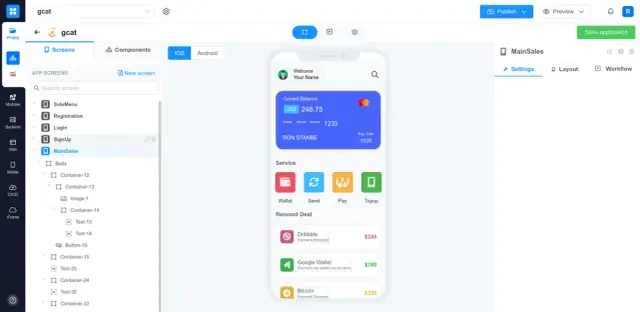How an App Can Transform Your Ecommerce
Discover how a custom app can transform your e-commerce business by enhancing customer experience, increasing sales, driving retention, and facilitating backend operations. Learn about essential features, tips for a successful app, and more.

The Importance of an App for Ecommerce
The rapid growth of e-commerce has revolutionized the retail industry and reshaped consumer habits. To remain competitive, businesses need to meet customers where they are, which means investing in a mobile presence.
A custom e-commerce app can be a transformative addition for your business, setting it apart from the competition and offering a uniquely engaging experience for users. With most online shoppers using their mobile devices to browse and buy, a well-designed app can make their shopping experience more pleasant and convenient. Furthermore, an app offers a much better personalization and customization opportunity than a responsive website or web app.
An e-commerce app also opens the door to employing advanced technologies, like augmented reality or location-based services, providing an even more interactive experience for your customers. These added features can often convert visitors into loyal, repeat customers.
Benefits of a Custom Ecommerce App
Investing in a custom e-commerce app has numerous benefits that directly translate into business growth and customer satisfaction. Some of the main advantages are:
- Improved User Experience: A well-designed app can offer a more seamless and enjoyable shopping experience, as it typically loads faster and is easier to navigate than a mobile website. This means customers are more likely to spend time exploring your app, boosting the chances of completing a purchase.
- Increased Brand Visibility: A dedicated app for your e-commerce store gives you a constant presence on a shopper's mobile device, increasing your brand's visibility. Moreover, the app icon can act as a subtle, yet effective reminder for the user to visit your store, driving more interaction and sales.
- Customer Retention: A carefully curated app experience can foster customer loyalty and increase retention. Personalized offers, tailored recommendations, and easy access to support can make your customers feel valued, encouraging them to shop from your app repeatedly.
- Push Notifications: With an app, you can use push notifications to reach customers in real-time, bypassing the crowded email inboxes. Timely, targeted notifications can inform users about promotions, discounts, and new product launches, encouraging them to re-engage with your store and potentially boost sales.
- Streamlined Backend Operations: A custom app can integrate with your existing e-commerce platform, automating essential backend processes like inventory management, order processing, and customer support. This leads to increased operational efficiency and reduces the likelihood of errors.

Essential Features for an Ecommerce App
To ensure your e-commerce app stands out and captivates users, it should include some essential features that enhance the shopping experience while optimizing your business operations:
- User-Friendly Design: A clear, intuitive design is critical for any e-commerce app. Focus on a seamless user interface (UI) and user experience (UX), prioritizing ease of navigation and providing users with quick access to essential features.
- Secure Payment Gateway: Trustworthy and secure payment options are paramount for any e-commerce app. Integrating the most reliable payment gateways and offering a variety of payment methods, including third-party wallets and one-click checkout, can put your users at ease and improve conversion rates.
- Personalized Recommendations: Leverage data-driven algorithms to offer users personalized product recommendations. By catering to individual preferences, you'll increase engagement, creating opportunities for upselling and cross-selling.
- Loyalty Programs: Reward loyal customers with exclusive deals, discounts, and benefits that can only be accessed via the app. This is a powerful way to build brand affinity and encourage repeat purchases.
- Advanced Search and Filters: Provide users with intuitive search options powered by smart algorithms that provide accurate and relevant results. In addition, offer comprehensive filtering options to help users find exactly what they're looking for quickly and easily.
- Social Media Integration: Facilitate social sharing and user-generated content by seamlessly integrating your app with popular social media platforms. This can increase your brand's visibility and help create a sense of community among your customers.
Considering these features and benefits, it's clear that investing in a custom e-commerce app can make a significant impact on your business's success and customer satisfaction.
Building Your Ecommerce App: Platform Choices
Choosing the right platform is crucial in developing a successful e-commerce app. Several options are available, ranging from native app development to hybrid solutions and no-code or low-code platforms. Weighing the pros and cons of each option is essential to achieving your e-commerce goals.
Native App Development
Native apps are built specifically for a particular operating system (OS), such as iOS or Android. These apps offer high performance, smooth user experience, and access to all native device functionalities. Yet, native app development usually requires more time, resources, and expertise.
Hybrid App Development
Hybrid apps are designed to function on multiple operating systems, using a single codebase. These apps are easier to maintain and typically have a faster development process than native apps. Still, hybrid apps might not provide the same level of performance, user experience, or access to native features as their native counterparts.
No-Code and Low-Code Platforms
No-code and low-code platforms, like AppMaster, offer a powerful alternative to traditional app development. These platforms enable the creation of feature-rich e-commerce apps without extensive programming knowledge. With a drag-and-drop interface, businesses can create, test, and deploy their custom apps at a fraction of the cost and time of traditional development.
AppMaster simplifies the entire app-building process while providing complete control over backend, web, and mobile application creation. AppMaster generates real applications, allowing you to export binary files or source code (depending on your subscription plan) and host them on-premises if needed. The platform's seamless integration with databases and scalability make it a popular choice for e-commerce businesses.

Tips for a Successful Ecommerce App
A well-crafted e-commerce app can be a game-changer for your business. Here are some tips to ensure your app drives customer engagement, retention, and revenue growth:
- User-centric design: Prioritize user experience (UX) by creating a visually appealing, easy-to-navigate interface that seamlessly adapts to different devices and screen sizes. Keep essential functions within easy reach and minimize the steps required to complete a task.
- Personalization: Use advanced analytics and customer data to offer personalized recommendations, promotions, and content tailored to individual preferences. This enhances user satisfaction and encourages repeat business.
- Push notifications: Utilize push notifications to communicate deals, promotions, and updates, driving user engagement and retention. Personalize these notifications and avoid excessive messaging to prevent user annoyance.
- Multiple payment options: Integrate secure, reliable payment gateways that offer a variety of payment methods, including credit and debit cards, digital wallets, and more. Easy checkout processes reduce cart abandonment rates and improve user satisfaction.
- Loyalty programs: Introduce loyalty programs and rewards to encourage repeat purchases and strengthen customer relationships. Use app analytics to optimize reward structures and keep users engaged.
- Responsive customer support: Offer convenient, multichannel customer support within the app to handle user inquiries and complaints. Swift, effective support improves user experience and fosters brand loyalty.
- Performance optimization: Test and optimize your app regularly, ensuring fast loading times, smooth performance, and minimal bugs/errors. Monitor user feedback, analytics, and crash reports to identify and resolve issues promptly.
Driving Sales and Retention with App Analytics
App analytics play a crucial role in the success of your e-commerce application by providing valuable insights into user behavior, preferences, and pain points. Leveraging these insights can help you optimize your e-commerce app to drive higher sales and retention rates.
Gathering and analyzing data from your app aids in making informed decisions that align with market trends and user expectations. Below are some essential aspects of app analytics that can elevate your e-commerce business:
- Performance metrics: Monitor performance metrics such as load times, crashes, and error reports to identify areas that require optimization. Regular fine-tuning ensures a glitch-free user experience, positively impacting user satisfaction and sales.
- User behavior analysis: Analyze user behavior patterns, like browsing history, purchase history, and time spent on specific sections of your app, to refine your marketing strategies and personalize user experiences, driving engagement and conversions.
- Conversion tracking: Track conversion rates across app features and distinguish successful elements from those needing improvement. Maximize your revenue potential by focusing on high-converting elements and refining underperforming ones.
- Retention and churn analysis: Understanding factors contributing to user retention and dropout can inform proactive actions to prevent churn, such as improving app performance, customer support, or personalization.
- User feedback: Solicit and analyze user feedback, including reviews and ratings, to gather valuable insights into areas that require attention. Addressing user concerns can enhance your app's credibility and improve satisfaction.
Leveraging app analytics enables a data-driven approach to e-commerce app development and optimization, ensuring a streamlined, targeted user experience that drives sales, increases retention, and fuels business growth.
The Future of Ecommerce and No-Code Apps
E-commerce is ever-evolving, buoyed by technological advancements and changing consumer behavior. Several trends become increasingly evident as we peer into the crystal ball to predict the future. No-code platforms are poised to become even more critical to the e-commerce industry as they empower entrepreneurs and businesses to react swiftly to market demands without requiring extensive technical resources.
Predictions and trends indicate that no-code development will further democratize app creation, with a surge in innovative e-commerce solutions tailored to niche markets. These platforms are expected to become more sophisticated, offering greater customization and functionality to suit diverse business needs. Moreover, the adoption of no-code development is likely to escalate with the rise of mobile commerce, as businesses seek to capitalize on the ubiquity of smartphones. We may see a fusion of e-commerce with other technologies such as VR (Virtual Reality) and AR (Augmented Reality) to create immersive shopping experiences, all achievable without writing a single line of code.
Evolving consumer expectations are shaping the future as well. Today's consumers demand not just convenience but also personalized experiences. No-code apps must be agile enough to offer tailored content, recommendations, and services. Features like AI-powered chatbots, personalized feeds, and interactive support are becoming standard expectations. Ecommerce businesses harnessing no-code app development can pivot quickly, ensuring they meet customers' needs for instant gratification and a seamless shopping journey from discovery to delivery.
The role of AI and machine learning in no-code development is becoming increasingly significant. These technologies provide powerful tools for data analysis, customer insights, and predictive behaviors, allowing businesses to automate and optimize their operations. No-code platforms integrating AI and machine learning can offer predictive analytics, enabling businesses to forecast trends, manage inventory more efficiently, and provide recommendations, thus elevating the user experience. Machine learning algorithms can also help improve app search functionalities, making products easier to find and thus increasing sales conversion rates.
In essence, the synergy of e-commerce and no-code application development drives toward an inclusive, innovative, and highly adaptable digital marketplace. Integrating AI and machine learning enriches this environment and ensures that e-commerce businesses remain competitive and relevant in a world where technology and consumer desires are in constant flux. As no-code development continues to break down barriers, the future looks bright for those who embrace it, promising a tapestry of growth, innovation, and customer satisfaction opportunities.
FAQ
A custom app can offer better user experience, enhance brand visibility, increase customer retention, and streamline backend operations, ultimately driving increased revenues.
Essential features include: user-friendly design, secure payment gateway, personalized recommendations, push notifications, loyalty programs, advanced search, social media integration, and robust analytics.
Consider the following factors: target audience preferences, app development platform, cost, scalability, and security.
Low-code and no-code platforms like AppMaster can streamline app development, minimize cost and technical debt, and offer more flexibility and scalability in comparison to traditional app development.
App analytics provide actionable insights on user behavior, performance metrics, and user feedback, allowing you to optimize your app and drive sales and customer retention.
A custom app can enhance customer engagement and satisfaction by providing personalized experiences, push notifications, loyalty programs, and seamless payment options.





